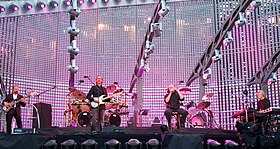 |
| This and other images linked from Wikipedia. |
I. Intro
People who know me know, I love progressive rock. It started when I became a Rush fan in the late 90s, then found out about the greater genre of "prog rock." Genesis was one of the first bands I checked out along those lines. I was familiar with them from the radio, but wasn't really aware of anything "prog" they'd done. Over the next few years, I delved into their catalog, pretty deeply. Although I never quite reached the same levels of fandom as Rush, I ended up absorbing most of their back catalog, and way too much trivia.
Fast forward to 2020, when The Kids are continuing to re-discover all this music. I've been active on the Discord server of Prog Notes, a new-ish podcast where they discuss and review prog rock records of old and new. The demographic of that community skews pretty young (I'm one of the oldest regulars there), and a lot of them have only heard one or two Genesis records. I realized I was yet again typing out my thoughts on each of their couple-dozen records every time someone asked for a recommendation. I thought to myself, I should write all this out and post it on my blog. And here we are!
II. Overview
Genesis was a band from England, active from the late 60s into the late 90s, and again for a reunion in the late 2000s. Being together for that long, you can imagine they went through a number of stylistic changes, and they sure did. They achieved international stardom in the 80s with their brand of synth-driven power pop, but in the 70s, they were one of the leading figures in progressive rock. By the time the 90s rolled around, they had a difficult time reinventing themselves yet again, and more or less called it quits. But their legacy looms large over both pop music and progressive rock.
tl;dr - If you're interested in the "prog" side of Genesis, I recommend starting with Selling England by the Pound and Trick of the Tail or Wind and Wuthering. If you like it, check out the next and/or previous records, and repeat until you get to one you don't like.
If you're more interested in the "pop" side of Genesis, pick up a compilation album, e.g., Turn It on Again: The Hits (the second disc of the 2-CD version of this one has some deeper cuts that can also serve as an introduction to Genesis's "prog years"). From there, check out more Genesis records featuring songs you liked (or see above for proggier stuff), and/or Phil Collins's and Peter Gabriel's solo work from the 80s.
III. Studio Albums
From Genesis to Revelation, 1969
Their debut album shows a group of youngsters trying to find their voice. At the time, their sound was steeped in acoustic hippie folk stuff. They added some orchestral arrangements, but the songs themselves were .. I dunno. Unremarkable.
My rating: For completionists only. 1/5
Trespass, 1970
Despite the first album not really going anywhere commercially, the band went pro, bought "real" instruments, and started gigging. They departed with their first manager/producer, and started finding their own sound. The resulting album is more identifiably Genesis, mixing pastoral acoustic bits with harder rock, driven by Anthony Phillips's distorted guitar and Tony Banks's Hammond organ. They ventured further into unusual lyrical territory with Peter Gabriel's burgeoning theatrical style. Songs were allowed to stretch out, no longer confined to narrow goals of being successful as singles.
My rating: Good stuff. 3/5
Nursery Cryme, 1971
Gigging proved to stressful for Phillips, and he ended up leaving. They cemented the guitarist and drummer positions with Steve Hackett and Phil Collins, respectively. Hackett brought in innovative playing and imaginative songwriting, and Collins brought a competent groove. As a band, they pushed their sound and creativity even further, with more theatrical story songs, elaborate and dynamic compositions, and more varied sounds.
My rating: Prog rock AF. 3.5/5
Foxtrot, 1972
The band were getting more confident in their abilities, and more comfortable with each other, and pursued their emerging prog-rock sound even further. From majestic Mellotron swells, to gentle acoustic bits, to widdly organ riffing, to literally apocalyptic musical climaxes, to extremely detailed and layered playing, this is peak Prog Rock. Peter Gabriel went all-in on the theatrics at this point, adding a new dimension to their live shows. The (mostly) side-long epic "Supper's Ready" is a bona-fide prog-rock classic.
My rating: PROG ROCK AF. 4/5
Selling England by the Pound, 1973
The band started seeing some commercial success, having broken through States-side, and kept pursuing their symphonic rock sound. Englishness permeates much of the record, in sound and in subject matter. Again, their sound varies from acoustic-driven passages, to jammy tradeoffs between Hackett's guitar and Banks's various keyboards, to theatrical silliness. "Firth of Fifth" features a classic Banks piano intro and a classic Hackett guitar solo.
My rating: Recommended. 4/5
The Lamb Lies Down on Broadway, 1974
Double albums were kind of a thing, and this is their big concept record. The concept isn't easily grokked at first (or twelfth) listen, but it's basically about a character named Rael and a surreal spiritual journey through various battles with himself and his base instincts. Musically, it's a little disjointed, with a lot of random interludes and tangents between the various scenes. I think a lot of the music and lyrics got written separately, and were coupled together later in the process of making the record. Some folks really like this record a lot, and others (like me), don't. A lot of the musical ideas just don't really connect with me, and the lyrics often don't pair well with the music. Some good moments of proggy symphonic rock, but (IMO) a bit too much filler.
My rating: A slog. 2.5/5
A Trick of the Tail, 1976
Gabriel left Genesis after the tensions of recording and touring The Lamb and his personal life became too much. The band soldiered on, writing new material. After failing to find a satisfactory new full-time singer, Collins was persuaded to lay down some vocals, and ... the rest is history.
Musically, there aren't any huge epic ideas, but they were still exploring a similar symphonic rock space, with plenty of complexity to nerd out about. Overally, the sound is similar to Selling England, but "bigger" overall, more lush and/or bombastic. Songs like "Entangled" and "Ripples..." show them still capable of gorgeous pastorality. A couple of the tracks don't do much for me, but the good stuff is good.
My rating: Recommended. 4/5
Wind & Wuthering, 1977
After Trick and the subsequent tour (with Bill Bruford filling in on drums) were well received, they kept on going--there were no brakes the Genesis train, though plenty of Banks, gahaha~. Though they continued in the symphonic rock direction as the previous record, the album is a bit more dynamic and varied, despite the monochromatic cover art. It has a very "romantic" and "English" feel to it. Despite Hackett's decreasing creative influence, it's one of my favorite Genesis records.
My rating: Recommended. 4/5
...And Then There Were Three..., 1978
Hackett left after the Wind & Wuthering tour to pursue a solo career (and greater creative freedom), and the other three guys weren't terribly heartbroken over it. Their first album as a three-piece shows them iterating on their bombastic symphonic rock sound. Mike Rutherford took over on guitar, handling rhythm duties admirably, but struggling playing convincing leads. They also intentionally kept arrangements simple, so as not to retread previous "epic" ground. The resulting album is .. fine. There are some good moments, and a lot of audible growing pains. Most notably, though, there's a bonafide Hit Single to close out the record, the gorgeously sweet "Follow You Follow Me."
My rating: A mixed bag. 2.5/5
Duke, 1980
The process of writing and recording material for Duke came easily, with the band members feeling refreshed from personal and creative rest. Ideas were freely shared and elaborated upon, and the result is a much more confident record. Rutherford found his voice as a lead guitarist, and Collins was finding his voice (literally and figuratively) as a lead singer. Banks continued to supply the bigger ideas and creative will to put it all together.
Musically, they continued to dial back some of the "progginess," phasing out the Mellotron and 12-string guitars. However, many of the songs still have that bombastic grandiosity they had mastered. In addition, they hadn't ruled out doing more conceptual stuff. On this record, six of the songs scattered throughout the album make up a "suite," dealing with fame and stardom and the trappings thereof. The last two tracks, "Duke's Travels" and "Duke's End" make up an aboslutely killer duology of bombastic symphonic rock, and might be my favorite Genesis material. Some of the material is kind of bland and unmemorable not unlike Three..., but the good parts show a band having success transitioning from a pretentious prog-rock band to a capable arena-rock band. More hit singles ("Turn It on Again," "Misunderstanding") certainly didn't hurt.
My rating: Another mixed bag, but better overall. 3.5/5
Abacab, 1981
The core three members of Genesis found a stable and productive core, and continued challenging themselves not to repeat their past. With this record, they made it even more of a point to avoid retreading old ground. As a result, Abacab leans more toward synth-driven pop-rock. They even brought in Earth, Wind, and Fire's horn section to add some funkiness to "No Reply at All" (and the B-side "Paperlate"). Again, the band refused to completely disavow their prog past, resulting in the lucid-dream-like "Me & Sarah Jane," the bombastically ambiguous "Dodo/Lurker" duology, and the extended indulgent instrumental outro on the title track.
A lot of fans of Genesis's proggier stuff, especially folks who grew up in the 70s, get off the bandwagon at this point. Me, I grew up in the 80s, and the synth-pop of Genesis is the sound of my childhood. I'm a fan.
Also, content warning for what might be Genesis's most hated song ever recorded, an incredibly goofy "Who Dunnit?" It started with Tony Banks messing with his new synth toy, grimacing at the awfulness of it, and the rest of band going all-in on it. It's really quite .. remarkable.
My rating: More pop than prog, but I like it. 4/5
Genesis, 1983
By now, the band had become very comfortable writing and collaborating as a three piece, and they continued pursuing their maturing synth-pop sound. By now, Collins had gotten a taste of solo success, but unlike Hackett, was still able to work compatibly with the other members of his "main" band. The overall sound is a bit darker than the previous two records, where even the more upbeat tracks have a sinister quality to them. The obligatory mini-epic comes in the form of the "Home by the Sea" duology, and features some great broody atmospheres between dark, but catchy synth-pop choruses and verses.
They continued to have commercial success, with multiple singles getting significant air play. Again, I grew up on this stuff, so I enjoy it. Unfortunately, the passage of time has not been kind to the well-intentioned, but stereotypical characterizations of Mexican immigration on "Illegal Alien." Either way, I recommend that anti-fans of the poppier side of Genesis steer clear.
My rating: Solid, moody dark-pop. 4/5
Invisible Touch, 1986
Listening to this back-to-back with something like Foxtrot or The Lamb might raise the question, is this even the same band anymore? Their synth-pop style had matured at exactly the right time for this to be a huge international success, resulting in a Side One of nothing but huge commercial hits, with the title track reaching actual #1 on the actual Billboard "Hot 100" chart.
A couple of deeper cuts, though, show the band still refusing to let go of their progressive past. "Domino" is creepy and apocalyptic, and "The Brazilian" is catchy and bombastic at the same time. Even "Tonight, Tonight, Tonight" has a nice atmospheric bridge with a huge build in the full album version.
I personally like the whole thing, though I acknowledge nostalgia and imprinting as significant factors. "Land of Confusion," though, in my opinion, is an objectively good rock song.
My rating: Pinnacle pop-Genesis. 4.5/5
We Can't Dance, 1991
The 80s closed out with Genesis having huge international success, as a band, and in Collins and Rutherford's case, also with solo/side projects. But as a band, they had a process that worked, and sessions 1991 produced more than enough material for a new album. They mixed things up on the production side with a new producer, but having mastered their particular brand of slightly off-beat dark-pop, the result isn't terribly dissimilar from the previous records. Some of the material is a little more sprawling, a little more atmospheric, but there's plenty of catchy radio fare as well. More commercial success resulted, with multiple singles getting significant airplay.
Personally, I feel like the overall quality isn't quite on par with the best of their 80s pop stuff. There are some great pop songs, and I even enjoy the campy "I Can't Dance" and the syrupy sweet ballad "Hold on My Heart." "Jesus He Knows Me" is a bouncy and biting satire of American televangelism, and "No Son of Mine" is effectively dark and creepy. The longer songs and the deep cuts, though, don't do as much for me. They're not bad, per se, just not quite as interesting as previous efforts.
My rating: More pop, but inconsistent. 3/5 (Yes, I like this record more than The Lamb.)
Calling All Stations, 1997
This time, it was Collins's turn to pour more of his creative self into solo efforts, leaving Banks and Rutherford to soldier on. They wrote some stuff, recruited a new singer, and released this record in 1997. Similar to Three..., this feels like a transitional album--a band feeling its way in search of a new sound. Personally, I like the sound they achieved, a dark atmospheric sound similar to the darker moments of their synth-pop days. Unfortunately, the songs themselves feel like they're missing something, and similar to the boring parts of We Can't Dance, just kinda wander aimlessly and unmemorably.
My rating: Unrealized promise. 2/5
Aftermath
Sadly, the album and subsequent tour were very unsuccessful. It did okay in Europe, but the entire American leg had to be cancelled due to lack of interest. Banks and Rutherford were apparently uninterested in scaling back to medium size, and let the band die silently and unceremoniously. I'd have been curious to hear what the band could have done to expand their smoky dark-pop sound from Calling All Stations, but given Banks and Rutherford's disappointment and resulting disinterest, it's probably for the best. I did come across a Youtube upload of an album's worth of B-sides from this period, and I do enjoy those quite a bit.
The band has reunited to varying degrees since then, but only as a touring entity. The other members have all remained active musically, releasing lots of music under various solo and side projects.
IV. Live Albums
Genesis Live, 1973
Kind of a stop-gap, commercially speaking, to capitalize on Genesis's growing popularity. The sound quality is a little rough, but it captures the band's live energy and immense sonic presence. From the creepy Mellotron beginnings of "Watcher of the Skies," to the huge walls of sound of "Return of the Giant Hogweed," to the pin-drop dynamics of "The Musical Box," this shows that the band could deliver the goods live. I like it a lot.
My rating: One of my favorites, even if it's "not for everyone." 4.5/5
Seconds Out, 1977
This one pulls mostly from the Wind & Wuthering tour, with one song from the Trick of the Tail tour. There's quite a bit of Gabriel-era Genesis showcased here, including all of side three devoted to "Supper's Ready." It shows that Collins was very much up to the task of taking on frontman duties, including Gabriel's vocal parts, though some of Gabriel's more idiosyncratic theatrical parts don't work quite as well. Though touring member Chester Thompson handles most of the drum duties, Collins adds some additional drums to the longer instrumental passages, which adds another level of bombast to pieces like "Los Endos" and "Cinema Show," the latter of which features the previous touring drummer, Bill Bruford (of Yes and King Crimson fame). Overall, this is a cleaner-sounding recording than Genesis Live, but to me, it sounds a bit more sterile too. This one's a favorite for a lot of fans, though.
My rating: Sides three and four are amazing. The rest, meh. 3.5/5
Three Sides Live, 1982
This one mostly covers the Abacab tour, but certain selections span all the way back to the Trick tour. It documents the peak of their bombastic symphonic rock period, as they were becoming a huge commercial success, and on the cusp of transitioning into a more full-time, radio-friendly synth-pop band. There are several recognizable radio hits, performed competently and engagingly, as well as lengthier incursions into their proggier recent past. The sound is clean, like Seconds Out, but with the band's confidence and energy intact. Touring guitarist/bassist Daryl Stuermer, a highly jazz and studio muscian, does a fantastic job filling out the sound, and permanent part-time touring drummer Chester Thompson keeps a solid groove going throughout.
The title refers to the original North American vinyl double-LP, where the fourth side consisted of B-sides and outtakes from Abacab and Duke. Other versions, including most CD reissues, replaces the studio tracks with a "fourth side live." There's a lot of good stuff, and captures a lot of what I love about this band. Probably my single favorite Genesis record. I even enjoy Phil's vocal .. thing .. on "Misunderstanding."
Side note: A few years ago, I stumbled on a fan-recreation called Three Sides Live Re-Sequenced, that expands this into somewhere around Seven Sides Live with additional high-quality bootleg-ish material from other early 80s concerts. Kinda really wish this could have been an official release, it's good stuff.
My rating: [CD reissue "fourth side live" version] A near-perfect record. 4.9/5
The Way We Walk, 1992
This was originally released as two separate albums, subtitled Volume One: The Shorts and Volume Two: The Longs. The reissue from the Live 1973-2007 box set resequences them as a single live double album, and I'm reviewing it as such. Either way, there's just not much to recommend about this. It's strange, I tend to like Genesis's live records overall more than their studio counterparts; e.g., Genesis Live and Three Sides Live are two of my favorite Genesis records, period. And I love 80s (and to a lesser extend, early 90s) pop-Genesis. But these records just feel bland to me. I think a big part of Genesis's engaging, arena-filling sound, Phil Collins's vocals, sound pretty weak compared to his performances from the 80s. Songs like "Land of Confusion" and "Invisible Touch" aren't nearly as catchy and engaging when the vocals sound tired.
My rating: Meh. 2/5
Live Over Europe 2007
The band originally wanted to reunite to do The Lamb live, but when Gabriel wasn't able to commit, they decided to "Turn It on Again" with the 80s touring lineup of Banks/Collins/Rutherford/Thompson/Stuermer. Collins's voice and drumming chops were pretty out-of-shape, and they had a difficult time constructing a proper Genesis show. They made it work, but they had to tune down almost every song to accommodate Collins's decreasing ability to hit higher notes. As a result, this one sounds even more tired than The Way We Walk. I've tried to revisit it a couple of times over the years, but ... I just can't. It's like watching a tired old dog that can barely walk .. but, more pathetic than endearing.
My rating: I don't even own this record. 1/5
V. Odds and Ends
Genesis has a lot of officially released non-album material, including demos, EPs, B-sides, outtakes, live tracks, remixes, etc. To try to catalog everything is a huge task for someone other than me. I like Genesis, but I'm nowhere near a completionist. I'll list some highlights below.
Singles, EPs, B-sides
We're getting into completionist territory here. There's a smattering of officially-released studio material that didn't make it onto proper albums. Some of these became their own standalone singles, like "Happy the Man," and "Paperlate," some of them were collected into standalone EPs, like Spot the Pigeon and 3x3 (the latter of which was released in North America as the "fourth side" of Three Sides Live). Many non-album studio tracks were released as B-sides to singles.
Several of these aren't necessarily bad songs, but didn't necessarily fit on the albums they were originally recorded for. "Do the Neurotic," a sweet instrumental, and "Feeding the Fire," a bombastic prog-pop tune, were recorded during the Invisible Touch sessions, but it's not clear which songs these would replace on the album proper. If Invisible Touch were released past the vinyl-LP era, these tracks would have made it, but alas.
Thankfully, most of these have been released as parts of various collections and box sets. See below!
Archive Box Sets
Disc three has some spicy live material from the Selling England tour, and a couple of early B-sides. The fourth disc mostly old demos and alternate takes, and pretty much solely for fans who really want to delve into the band's formative years. The booklet has lots of sweet liner notes and old photos.
The second Archive set covers the Phil Collins-led years, and is loaded with B-sides, random live tracks, and, for some reason, 12-inch dance remixes. Notably absent is anything from the Ray Wilson band.
Late 2000s remastered Box Sets
Coinciding with the 2007 reunion tour, We Can't Dance producer Nick Davis undertook the task of remixing and remastering most of Genesis's back catalog. The result was a series of box sets covering three periods of studio albums (Trespass through Lamb, Trick through Abacab, and Genesis through Stations), a live box containing the officially released live albums plus the 1973 set from the Archives box set, and a box set of concert videos.
The remixes are overall quite good. The older material especially benefits from greater higher-end clarity, making Collins's drums sound really snappy. However, the mastering often suffers from overcompression due to the Loudness Wars, and it's occasionally distracting.
There's a ton of bonus material, including most of the non-album tracks and B-sides, and lots of extra live material. Notable exclusions are the Lamb live performance and fourth disc of very early stuff from Archive #1. The studio albums also have bonus DVDs with music videos, live clips, interviews, tour booklets, and other random fan goodies.
VI. Solo and other Side Projects
The primary members of Genesis have all had prolific careers outside of the main band, with varying degrees of commercial and/or artistic success. I'm not familiar with everything everyone has ever done (another huge task for someone other than me), but what I'll do my best to list some highlights.
Anthony Phillips
A founding member, and one of the key members of the original band, returned to music in the mid-70s with his own solo project, assisted by former bandmate and long-time friend Mike Rutherford. The Geese & the Ghost is pretty well regarded as an extension of the pastoral sound Phillips brought to the early band, though I haven't heard it personally. He's also produced quite a few more albums over the years and decades. Again, I'm not familiar with any of it, but I know he's got his fans.
Peter Gabriel
It took him a couple years after leaving Genesis, but once he found his musical legs, he came into his own as a solo artist. He developed his own brand of somewhat-twisted dark pop, but also incorporated a lot of world music influence. A lot of his material is ... well ... horny. But a lot of is very mature and socially aware. He also achieved massive international commercial success in the 80s, to the point where his single "Sledgehammer" knocked off "Invisible Touch" off the top of the US charts. He's also produced some movie sound tracks and had a lot of success as a touring musician.
Steve Hackett
In the 2000s, he became a de facto flag-bearer of prog-Genesis, with a series of Genesis Revisited tours and live albums. His live band reproduces a lot of Genesis material very meticulously, and with a lot of spirit. He remains very prolific as a recording musician, releasing albums of new material on a very regular basis. And personally, I think most of it is solid. He has evolved a kind of dreamy lush sound, a kinda more mature version of 70s Genesis. Recommended.
Phil Collins
Yeah, this guy. He broke out as a solo artist with "In the Air Tonight" in the early 80s, and achieved *HUGE* international stardom as a result of success as a solo musician and as Genesis's frontman. His solo albums in the 80s are pretty solid R&B-influenced pop affair, with regular delvings into darker territory not unlike the dark-pop of 80s Genesis a la "Mama" or "Tonight, Tonight, Tonight." Yeah, there's also syrupy ballads, but .. Yeah. If you like middle-of-the-road pop music with heart and groove, though, his 80s albums are all worth a listen.
He's also been very prolific as a guest musician and sideman, sometimes as a one-off guest drummer, sometimes as producer and collaborator, sometimes as a co-performer, sometimes as a full band member. Lots of prog-heads swear by his work with Brand X, though I remain woefully unfamiliar.
Mike Rutherford
I'm significantly less familiar with Rutherford's solo work. He released a couple of albums under his own name in the 70s/80s, to modest success. Apparently his album Smallcreep's Day is pretty well regarded among some Genesis fans, though I haven't heard it personally.
He achieved commercial success in the late 80s with Mike + the Mechanics, which became his main side project.
Tony Banks
I'm least of all familiar with Tony Bank's side projects, but I feel like I should change that. His first solo album, A Curious Feeling is supposedly more of the romantic pop-prog stuff Genesis was doing in the late 70s. He tried his hand at solo-pop-stuff in the late 80s as Phil Collins and Mike + the Mechanics were charting, but, though it was apparently critically decently well received, didn't quite bust the charts like "One More Night" or "All I Need Is a Miracle" did. Oh well.
More recently, he's tried his hand at composing proper classical music. I think he's done three albums in that vein. I have no idea if they're any good or not. But they keep coming out, so apparently at least somebody likes them?
Daryl Stuermer
Stuermer has remained active as a live musician, living mostly in a melodic fusion, or "smooth jazz" style. He has a regular live band of highly skilled musicians, but the focus is on Stuermer's fluid, melodic lead playing. Some of it can sound kinda muzak-y, but I enjoy it.
He achieved some modest commercial success with an album of Genesis reinterpretations, Another Side of Genesis. Musically it continues in the muzak/smooth jazz vein, with Stuermer's guitar leads taking the place of Collins's vocals. I enjoy it, but I like smooth jazz, so... Yeah.
Fun side note: I was living in the Milwaukee area at the time, and "Follow You Follow Me" got a lot of airplay on the local smooth jazz station. When I went to see him live around the time the CD came out, the venue was packed with retirees, and I was easily the youngest person there.
VII. Conclusion
Holy knuckles I wrote a lot.


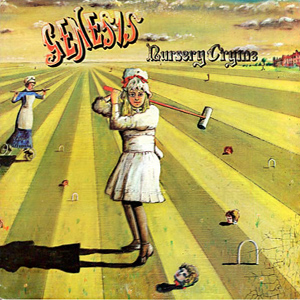
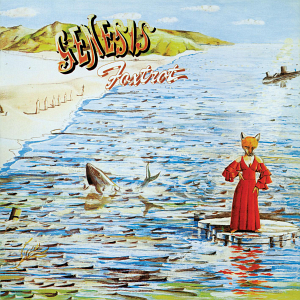

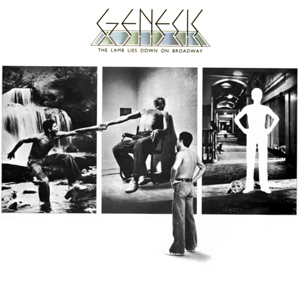
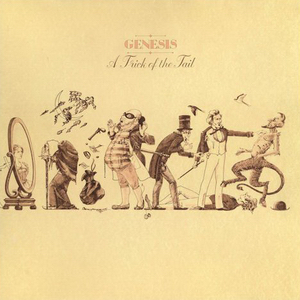




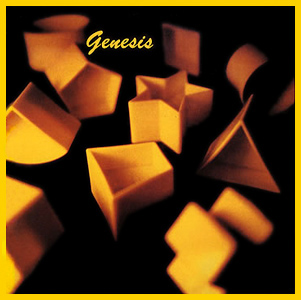

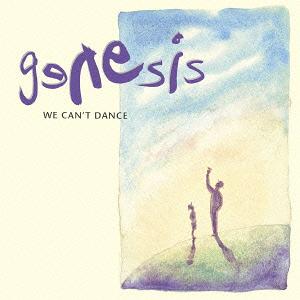



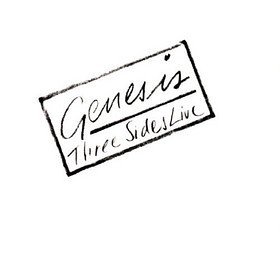
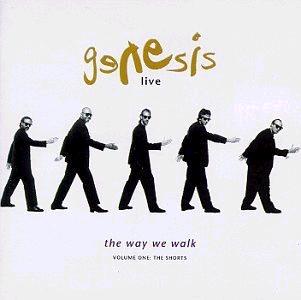

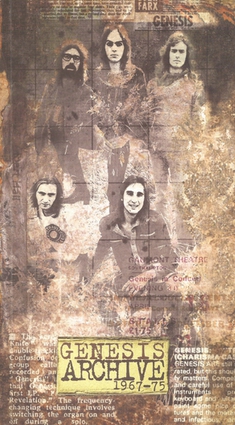
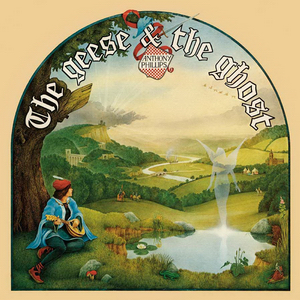
.jpg)
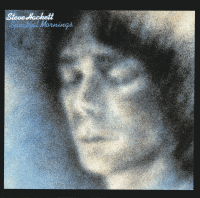

.jpg)

_Cropped.jpg/220px-Phil_Collins_-_Royal_Albert_Hall_-_Wednesday_7th_June_2017_PhilCollinsRAH070617-20_(35255872705)_Cropped.jpg)
